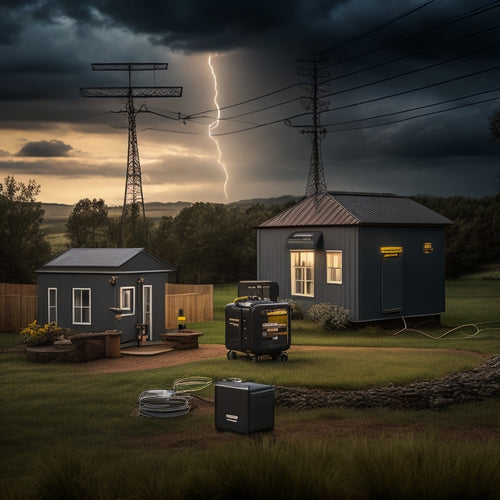
Installing Emergency Backup Power for Small Businesses
Share
Installing emergency backup power is essential for your small business's resilience. Reliable systems, such as battery backups or generators, guarantee you maintain operations during outages, safeguarding revenue and customer trust. Begin by evaluating your power requirements to identify vital equipment, and choose a system that aligns with your budget and operational needs. Consider cost-effective options, including portable generators or solar panels with batteries, which typically require less maintenance than traditional generators. By implementing the right backup solution, you can minimize downtime and operational costs while enhancing your energy efficiency. There's more to uncover about optimizing your backup strategy for maximum benefits.
At a Glance
- Assess your critical equipment needs to ensure the backup power system supports essential operations during outages.
- Choose a suitable backup power system, such as generators, solar panels, or hybrid solutions, based on your budget and sustainability goals.
- Calculate total power load requirements by summing wattages of essential devices, accounting for starting watts where applicable.
- Consider DIY installation to reduce costs, while ensuring compliance with local regulations and safety standards.
- Explore financial incentives, such as tax credits or grants, to lower the overall investment in backup power solutions.
Cost-Effective Power Solution
When evaluating backup power options, you need to take into account budget-friendly solutions that align with your financial constraints.
Battery backup systems not only provide immediate relief in emergencies but also present long-term savings potential through reduced operational costs.
These systems guarantee reliable energy during grid failures, which can greatly impact your business's resilience and profitability.
Identifying the right solution can greatly impact your business's resilience and profitability.
Budget-Friendly Options
For small businesses, finding budget-friendly options for emergency backup power is vital to guarantee continuity during outages without straining finances.
One effective approach is to evaluate DIY installations. By leveraging your skills or those of your team, you can greatly reduce labor costs associated with professional installations. Researching local regulations and guidelines confirms compliance while maximizing the benefits of self-installation.
Additionally, exploring community resources can be beneficial. Many local organizations offer grants or programs aimed at supporting small businesses in securing backup power solutions. Connecting with fellow business owners can provide perspectives into cost-effective strategies and recommendations for affordable equipment.
Portable generators are another viable option, allowing you to power essential devices without a hefty upfront investment. When selecting a generator, verify it meets your power needs and is fuel-efficient.
Lastly, examine energy-efficient appliances that reduce your overall power consumption. This not only lowers your electricity bills but also requires less backup power during emergencies.
Long-Term Savings Potential
How can investing in emergency backup power translate into long-term savings for your small business? By enhancing your energy efficiency, you're not only safeguarding your operations during outages but also reducing operational costs over time.
When you integrate a reliable backup system, you mitigate the financial losses associated with downtime. Every hour your business remains operational translates to revenue preservation.
Additionally, many local and federal programs offer financial incentives for businesses that adopt energy-efficient technologies. These incentives can greatly lower your initial investment costs, allowing you to allocate resources elsewhere.
When you factor in potential tax credits or rebates, the long-term savings become even more evident.
Furthermore, some backup power systems employ renewable energy sources, which can lead to reduced utility bills. As energy rates fluctuate, having your own power source can insulate you from rising costs, ensuring stable expenses.
Ultimately, investing in emergency backup power is more than a safety net; it's a strategic financial decision. By enhancing energy efficiency and taking advantage of available financial incentives, you position your business for sustainable growth and considerable long-term savings.
Reliable During Power Outages
When power outages strike, having a reliable backup power system is essential for maintaining operations.
Solar power backup systems not only guarantee continuity during outages but also greatly lower monthly energy costs, making them a cost-effective choice for small businesses.
You'll need to understand the types of systems available, from generators to battery backups, and their respective benefits.
This knowledge guarantees you can select a solution that keeps your business running smoothly during disruptions, especially when considering the advantages of enhanced energy security that these systems offer.
Importance of Backup Power
In the event of a power outage, having a trustworthy backup power system becomes essential for small businesses. Without it, your operations could come to a standstill, jeopardizing both revenue and customer trust. A backup power solution guarantees business continuity, allowing you to maintain services and fulfill orders even when the grid fails.
Operational resilience hinges on your ability to withstand disruptions. When you invest in a strong backup system, you're not just protecting equipment; you're safeguarding your business's reputation. Customers expect reliability, and any lapse can lead to diminished loyalty.
Moreover, the financial implications of downtime can be severe. Research indicates that small businesses can lose thousands of dollars for every hour of lost productivity. With a dependable backup power solution, you mitigate these risks, creating a safety net that enables you to focus on growth rather than merely surviving outages.
In a world where power disruptions are increasingly common, prioritizing backup power isn't just a technical decision; it's a strategic move toward securing the longevity and stability of your enterprise.
Don't leave your business vulnerable—invest in the security of backup power today.
Types of Systems
Several reliable systems can provide backup power during outages, each designed to meet different needs and operational scales of small businesses.
One option is a generator, which can be powered by diesel, natural gas, or propane. Generators offer immediate power restoration but require regular maintenance and fuel supply.
Another effective choice is integrating solar panels with battery storage systems. This approach allows you to utilize renewable energy, storing excess electricity generated during the day for use during outages.
Solar systems can reduce your reliance on traditional power sources, giving you greater autonomy and long-term savings.
For businesses looking for a more sustainable option, hybrid systems combine generators with solar panels and battery storage. This setup provides flexibility, allowing you to switch between power sources based on availability and cost.
Ultimately, the best system for your business depends on your specific operational requirements, budget, and sustainability goals.
Assess your energy needs and consider how each system aligns with your objectives. By choosing the right backup power solution, you can guarantee your business remains operational, regardless of external circumstances.
Key Specifications Overview
When selecting emergency backup power, understanding power capacity requirements is essential for your business's needs.
You'll also want to compare different fuel types to determine which option aligns with your operational demands and budget.
This analysis will guide you in making an informed decision that guarantees reliability during outages.
Power Capacity Requirements
How do you determine the appropriate power capacity for your small business's emergency backup system? Start by evaluating your typical power consumption. Identify your essential equipment—computers, HVAC systems, and critical lighting—and calculate the total wattage needed during an outage. This guarantees you're not left in the dark.
To achieve energy efficiency, it's wise to choose a backup system that matches your peak load without excessive overhead. Below is a table that outlines common equipment and their approximate power requirements:
| Equipment | Power Consumption (Watts) |
|---|---|
| Desktop Computer | 300 |
| Printer | 150 |
| Refrigerator | 800 |
| HVAC System | 2000 |
| LED Lighting (10 bulbs) | 100 |
Fuel Types Comparison
Choosing the right fuel type for your emergency backup power system is vital for efficiency and reliability.
Diesel generators are often favored for their durability and long run times, making them ideal for extended outages. However, they require regular maintenance and can emit higher levels of pollutants.
Propane options provide a cleaner alternative, with lower emissions and easier storage. They can be efficiently used in smaller units but may have a shorter shelf life compared to diesel.
If you're considering natural gas, it offers convenience through a continuous supply and minimal emissions, but your location must have reliable access to gas lines.
Furthermore, renewable energy sources, like solar or wind, can be integrated into your backup system. While they're more sustainable, their effectiveness largely depends on the availability of resources and initial setup costs.
In choosing a fuel type, weigh the pros and cons of each option based on your business needs, budget, and environmental considerations.
This analysis will help guarantee you have a dependable and efficient emergency backup power system that aligns with your operational freedom and sustainability goals.
Assessing Your Power Requirements
To guarantee effective emergency backup power, you need to identify your critical equipment needs first.
Understanding your system size and battery type can also help inform your decisions, as home energy storage system costs vary based on capacity and performance.
Once you've pinpointed the essential devices, calculate their total power load requirements to determine the necessary backup capacity.
This approach assures that your business remains operational during power outages.
Identify Critical Equipment Needs
Identifying critical equipment needs is essential for maintaining operational continuity during power outages. Start by evaluating your business operations and pinpointing which equipment is crucial for functioning. This means looking at everything from communication systems to refrigeration units, depending on your industry.
Next, focus on equipment prioritization. Determine which devices support essential functions and should receive power first during an outage. For example, if you run a medical facility, life-support machines and refrigeration for medicines likely take precedence. Conversely, in a retail environment, point-of-sale systems and security systems might be your top priorities.
Developing a thorough list of critical equipment not only aids in emergency preparedness but also helps you gauge the scale of backup power needed. This evaluation allows you to create a strong strategy that aligns your equipment needs with available power solutions.
Calculate Power Load Requirements
Calculating your power load requirements is a critical step in guaranteeing your backup power solution meets the demands of your essential equipment. To do this effectively, you need to assess the power consumption of each device that will run during an outage. This involves checking the wattage ratings, which are often found on the equipment itself or in the user manuals.
Next, consider the energy efficiency of your devices. More efficient equipment may require less power, allowing you to optimize your backup system. Here's a simple table to help you organize your findings:
| Equipment | Wattage (Watts) |
|---|---|
| Computer | 300 |
| Printer | 150 |
| Lighting | 200 |
Once you've listed your critical equipment and their respective wattages, sum them up to determine your total power load. Don't forget to factor in a buffer for starting watts, particularly for devices with motors. This calculation guarantees that your backup power supply can handle the load, providing you the freedom to operate smoothly during outages.
Lower Maintenance Than Generators
When considering backup power options, you'll find that emergency power systems typically require minimal upkeep compared to traditional generators.
This reduced maintenance translates to lower operational costs and less downtime for your business.
Minimal Upkeep Requirements
Emergency backup power solutions, such as battery storage systems, offer considerable advantages in maintenance over traditional generators. With minimal upkeep requirements, these systems allow you to focus on running your business rather than worrying about equipment failure. Battery systems don't require regular oil changes, fuel sourcing, or extensive monitoring, making them a more convenient choice.
To guarantee peak performance, you can follow a straightforward upkeep schedule. Here's a quick comparison of maintenance needs:
| Maintenance Task | Battery Systems | Traditional Generators |
|---|---|---|
| Regular Inspections | Monthly | Weekly |
| Oil Changes | None | Every 100 hours |
| Fuel Supply Management | None | Continuous |
As you consider installation tips, remember that the simplicity of battery systems can greatly reduce downtime and operational costs. By choosing a low-maintenance solution, you can enjoy peace of mind, knowing your backup power is reliable when you need it most. Freedom from constant upkeep allows you to allocate resources and time toward growing your business instead.
Frequently Asked Questions
What Types of Businesses Benefit Most From Backup Power Systems?
Grocery stores, healthcare facilities, data centers, manufacturing plants, retail outlets, and restaurants all thrive with backup power systems. You'll guarantee operational continuity, safeguard sensitive equipment, and maintain customer trust during outages, enhancing your business resilience.
How Long Does Installation Typically Take for Backup Power Solutions?
The installation timeline for backup power solutions usually ranges from a few days to a couple of weeks. You might encounter installation challenges like permits or equipment delays, but proper planning can streamline the process considerably.
Can Backup Power Systems Be Integrated With Renewable Energy Sources?
Yes, backup power systems can integrate seamlessly with renewable energy sources, creating hybrid power systems. This combination maximizes efficiency, reduces reliance on traditional energy, and enables you to maintain control over your energy strategy and sustainability goals.
Are There Financing Options Available for Purchasing Backup Power Systems?
Imagine catching a wave; financing options for backup systems can propel you forward. Government grants and leasing options help ease costs, ensuring you maintain energy independence without sacrificing financial stability or freedom in your choices.
What Safety Certifications Should I Look for in Backup Power Equipment?
When evaluating backup power equipment, look for certifications that meet safety standards like UL or CSA. These guarantee equipment reliability, reducing risks during emergencies and providing you the freedom to operate without concerns about safety.
Explore More
In summary, installing emergency backup power for your small business is a smart move. Not only is it a cost-effective solution, but it also guarantees reliability during unexpected outages. By evaluating your power requirements accurately and choosing a system with lower maintenance needs than traditional generators, you're setting your business up for success. Don't wait for a blackout to realize you need it; think ahead like a chess expert and secure your operation's continuity today.
Related Posts
-

Net Metering in Renewable Energy's Future
Net metering's future is vital for driving renewable energy growth and financial savings. You can reduce your electri...
-

Why Outdoor Solar Lighting Systems Are Sustainable
Outdoor solar lighting systems are sustainable because they utilize renewable energy, drastically reducing your carbo...
-

Key Components of a Reliable Emergency Power Supply System
A reliable emergency power supply system requires several key components. You need proven performance metrics to guar...


